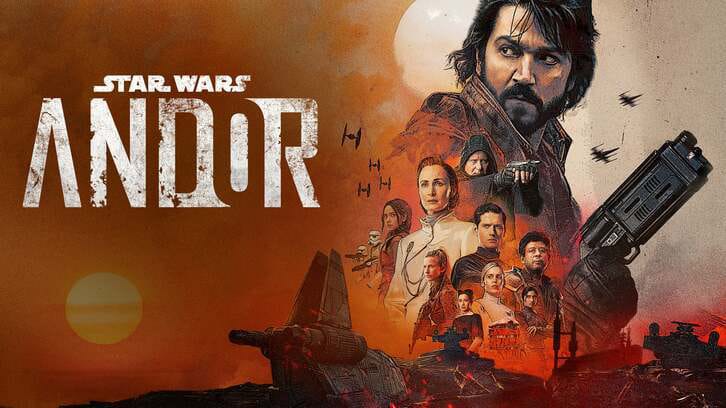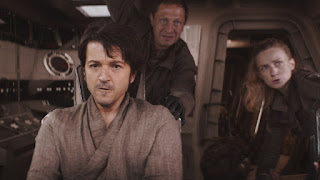
Like many reviewers have said before me (it sometimes feels like the number one thing anyone is saying), Andor is nothing like the original Star Wars shows Disney+ has released so far. For the most part, reactions to that idea seem to be positive, and a large part of me agrees with that. But the other part of me saw it slightly differently than that. Read on for my review of Andor.
Andor goes back in time, tracing the much-alluded-to origins of Rogue One’s enigmatic rebel Cassian Andor (Diego Luna). Cassian is arguably one of the only recent Disney franchise characters whose character development in Rogue One – or, more aptly, lack of time for it – really warranted a prequel to be made, so in spite of my general disappointment with the majority of Disney+ properties, I walked into this one with fingers crossed.

In all fairness, Andor already had two major things working for it in terms of differentiating it from the rest of Disney’s streaming series, the first being the infallible likability of Diego Luna in the title role, and the second being Rogue One’s genuine human approach to a Star Wars spin-off idea meant as a clear cash grab. In the end, both of these factors certainly helped Andor along to become one of the best properties in the space opera’s extensive canon.
Rogue One, in hindsight, is a seemingly irreplicable event in movie franchise history. Its release was perfectly timed, as the MCU made its ascension to the peak of the zeitgeist with its promise that “It’s all connected,” and in-between the release of The Force Awakens, which reinvigorated the cultural Star Wars hype and The Last Jedi, which significantly dampened it. It would only be two years until Black Panther was nominated for Best Picture, and Disney was snapping up every up-and-coming indie director to helm their upcoming franchise installments like it was a game of Hungry Hungry Hippos. Disney, clued in by the success of the MCU, was changing their strategy for Star Wars too, and Rogue One was the first experiment.
Maybe because it was an experiment of sorts, Rogue One got to be something that Disney wouldn’t dare let one of its properties be nowadays – final. Spoilers if you haven’t seen it, I guess, but the movie ends in a mushroom cloud that obliterates every main character and every villain as Princess Leia speeds off in a spaceship above, holding onto “a new hope” in the form of the hard-won plans for the Death Star. There’s no bleeding something dry when the nuclear option was already played out. Like lopping a branch from an overextending tree, with this ending writers Chris Weitz and Tony Gilroy protected their characters from miracle resurrections or retconned lore or inexplicable cameos in future projects that would cheapen their characters’ potent sacrifices.

But, obviously, one unanswered question from Rogue One did remain, and hence, Gilroy has returned now to helm Andor. And as I said, if any Star Wars thing had to be made into another Star Wars thing, Cassian’s backstory was the best choice. Out of any of these major Disney+ shows, Andor’s existence feels the least forced and the most earned. After all, Rogue One was based on the idea of showing a more human, boots-on-the-ground-type look at the Rebellion, and Cassian’s character remained enigmatic even as he acted as the strongest tether to that ideal. The natural path for Andor was to expand on that down-to-earth vision, which it did, arguably even better than the movie did.
Slow and methodical in its pacing, with neatly divvied-up plotlines unfurling one after another, it struck me at some point in the middle of Andor that I was barely watching a Star Wars property at all. And I don’t mean that as a complaint – if you ever hear me asking for more laser gunfights and CGI animal characters designed to sell plushies, shoot me, that’s the evil clone. What I mean by that is to say that Andor renders conflicting thoughts in the viewer about what, exactly, we are meant to be understanding and taking away from this show.
Much like its mother property, Andor shows the underbelly of the Rebellion against the Empire in a level of intricacy the main Star Wars movies never reached. The series begins with Cassian murdering two Imperial officers, and soon we discover that his turn from self-serving black market dealer to unfaltering Rebel hero had its origins more in his need to escape from the law than any heroic sense of duty. Characters traverse dicey political and interpersonal relationships while also trying to keep their support of the Rebel Alliance a secret. Cassian’s family and friends on his adoptive home planet of Ferrix sacrifice much to keep his whereabouts hidden.

But most striking of all is the multi-episode arc where Cassian ends up wrongfully incarcerated in a prison where all the inmates are forced to compete with one another working in assembly as they stand on a floor that their captors could electrocute at will, killing them all. At the end of the arc, the prisoners, led by his floor manager Kino (a riveting Andy Serkis performance), discover that when their sentences end prisoners are only relocated, not freed, and start a jailbreak, from which only a tragic few other than Cassian escape. This part of the series is excellent storytelling, and has justly gotten a lot of praise, but to me its existence does not feel quite copacetic with what Star Wars is today, and that drew me out of the narrative. Can something made by one of the biggest powerhouses in global culture today – one with a very public focus on the bottom line, a history of mistreating employees and its hands deep in U.S. politics, as demonstrated by their part in the “Don’t Say Gay” controversy earlier this year – really effectively capture and laud rebellion against an unjust authority figure?
It’s revealed at the end of the season that the parts Cassian and his fellow prisoners were assembling would one day be a part of the Death Star – while something I didn’t really want to know, “the Death Star was built by slave labor” is not the most shocking piece of lore that could have been dropped in the series. But it also feels much, much too reminiscent of real life – the fact that Disney is building their empire on Disney+, churning out a new event show every week, spending so much money on these franchise shows only to overwork and underpay crucial crew members such as VFX artists. No matter how well as it’s told, it’s much harder to believe a narrative that roots for the little guy as it comes directly from the big guy. The refreshing nuance of the show lessens knowing that the production behind it is affiliated with or possibly even participating in a version of the very injustices it seeks to condemn.
As soon as that thought nagged at me, it was like a loose thread, one I tried not to pull at for fear of losing my engagement with the rest of the show. When you consider this insincerity of delivery, suddenly all of the things that made the show good – other than Luna’s performance – become quite threadbare. Not to mention, Disney’s recent bloodthirsty full-tilt into capitalizing on everything humanly possible clings to Andor’s leg, tugging at its sleeve like a spoiled child. Only on Disney+ can your enjoyment of a show be interrupted by the question of which anthropomorphized animal or robot character would become the star of its own merch line. Is no one else tired of stories where you are given one ending and yet you still expect some last-minute Deus Ex Machina to fly in and open the door for yet another movie or mini-series, because “Oh, no, that actor’s contract isn’t up yet?” Even if these acts of fanservice don’t come, it’s the expectation that mars the experience.
The best part about Andor is that it is good. In spite of a few less interesting characters and plotlines (Pretty much just Syril, for both), it is from top to bottom a solid production that takes an existing beloved character and expands on their backstory in a competent way. The worst part about Andor is also that it is good. Because as of late, any time Disney hears “good,” they see dollar signs, and pursuit of that is enough to ensure that it won’t stay good for long. After all, Rogue One was good, and its success was a metaphorical greenlight for a movie or TV series about any and every character that has ever had more than five minutes of screen time, and our TVs are flooded with “must-see” event shows every week, until none of it is special anymore.
Although carried by its abnormally conscious subject matter and stellar lead performance, Andor is missing something in its soul. Circumstances outside of its control make its messages and themes feel tedious and insincere by default. It’s not that I’m suggesting that Disney is incapable of making a good show based on their franchises; Disney+’s individual track record simply suggests that they don’t care whether or not they do. Just because something of quality has been spit out of the machine doesn’t change the fact that it is the product of a quantity over quality model. I would hate to believe it, but I can’t help but feel that the second Cassian zips off at the end of season 2, effectively setting in motion the events of Rogue One, Bix or Syril or Vel or even B2EMO will step into the key light for their hero shot and “X Will Return” title card. I really hope that won’t happen.
But if it does, consider this my uber-cynical “I told you so.”
What did you think of Andor? Thoughts on the season, or what might happen next? Leave a comment down below!
